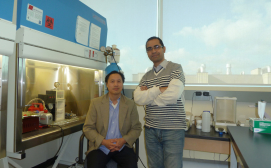Project Lead(s): Duane Chung
Issue
Cervical cancer is the leading cause of female cancer mortality and, of the 266,000 lives lost each year, more than 85% occur in low- and middle-income countries (LMICs).
Effective, preventative vaccines exist but are the most expensive vaccines procured by international organizations. Annually, there are 50 million girls of eligible vaccination age in LMICs.
Solution
The project initially sought to determine whether microalgae could be used to produce a vaccine for papillomavirus (HPV), which is responsible for 70% of cervical cancer cases.
While developing the necessary tools to produce the HPV vaccine in microalgae, the team also chose to cultivate a second production system for the HPV vaccine, to enable the comparison and benchmarking of the productivity of the microalgae production system.
Outcome
The project team struggled to achieve long-term expression and production of test proteins in microalgae.
However, they were able to achieve reasonable production of the HPV vaccine using the secondary production system.
As a result, the team made the decision to focus on the development of the secondary production system, and revisit the microalgae production system when more funds become available.
By focusing on developing the secondary production system, the team was able to substantially improve upon this production system and achieve significant production levels of HPV vaccine.
The team achieved high-level production of HPV vaccine L1 protein for the most common type 16 and type 18 HPV subtypes.
In as little as one litre of low-cost medium, the team produced sufficient HPV type 16 L1 protein to fill over 70 doses of vaccine, and sufficient HPV type 18 L1 protein to fill over 1,500 doses of vaccine.
This high level of vaccine productivity could support the sale of vaccine doses for under $2 per dose versus the current cost per dose of commercial HPV vaccine in the United States of $130–$150 USD per dose.
As a result, they believe this vaccine will enable the implementation of HPV vaccination programs throughout India, Bangladesh and other LMICs.
The team intends to apply for Transition To Scale (TTS) funding and to obtain initial regulatory approval for the HPV vaccine. They are ready to commercialize the vaccine and are seeking a manufacturer to produce the drug.


